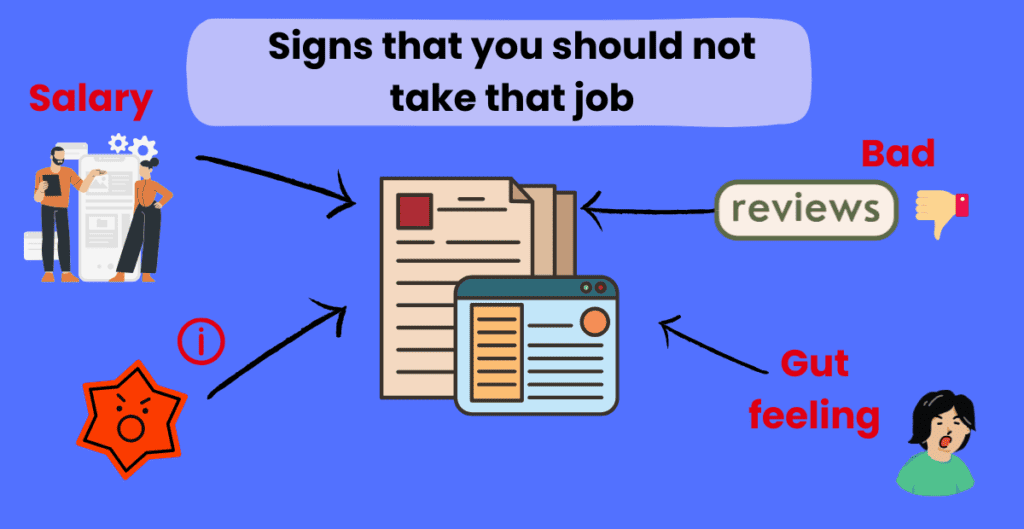10 Signs You Should Not Take the Job

Table of Contents
Key Takeaway
- Exercise caution if the job role seems vague or misaligned with the initial advertisement.
- Be wary of a company with consistently high employee turnover rates; research retention history.
- Check employee reviews for insights into company culture; be cautious if consistent concerns arise.
- Consider the company’s culture and values; ask about them and observe them during interactions.
- Assess the potential for career growth and development; look for a clear advancement path.
Introduction
It’s a scenario we’ve all faced at some point. You are looking at career growth. You’ve gone through the job search process, nailed the interview, and now, you have an offer. But something feels off.
Should you ignore the red flags and take the job? Or is it better to decline and keep looking? Sometimes, it’s hard to tell. But don’t worry; we’re here to help you navigate this tricky situation.
By the end of this article, you will be better equipped to make the right decision about your employment prospects.
1. Mismatched Job Description:
Proceed with caution if the new job role seems vague or does not align with what was advertised. Often, this discrepancy could indicate a lack of organization or that the company needs more clarification on what it doesn’t need.
On the other hand, it could also mean that the role involves more responsibilities than initially stated. Before signing your contract, ask your employer clarifying questions and ensure you fully understand the job’s expectations and responsibilities.
2. High Employee Turnover:
A company that consistently struggles to keep its employees can be a significant red flag. High
Turnover rates often suggest an unstable work environment, whether poor management, lack of growth opportunities, or unfavorable working conditions.
It’s also a good idea to do some research about the company company’s retention. If people leave the company quickly or frequently, it might be a sign that you should think twice before accepting the job.
3. Negative Employee Reviews:
Just as you would check reviews before purchasing, you must do your due diligence and look up employee reviews for the company. Websites like Glassdoor or Indeed can provide valuable insights about the company culture, work-life balance, management, etc.
If the reviews are predominantly hostile and filled with consistent concerns and complaints, it’s a red flag. Remember, everyone is unique, and it’s portable to have some negative reviews. However, if multiple past or present employees persistently highlight the same issues, it’s wise to reconsider the job offer.
4. Unappealing Corporate Culture:
The company culture is essential to consider when accepting a job offer. It’s the heart of a company, dictating the work environment, ethos, and values. It might not fit you if the company doesn’t share your values or preferences.
You want to work where you feel comfortable, respected, and valued. If you sense that the corporate culture is one you wouldn’t like or does not fit your values, it’s a reason to think twice before accepting.
It’s a good idea to ask about the corporate culture or to look for clues while talking to employees or walking around the office.
5. Lack of Growth Opportunities:
Another critical factor to assess when considering a job offer is the potential for growth and professional development. Every job should offer ways to improve your skills or advance your career. The job may only contribute positively to your long-term career goals if these opportunities are present.
A clear path for advancement or a solid commitment to employee development through training programs and education indicates that a company values its employees and is invested in their growth. Consider reconsidering the offer if you sense a lack of these opportunities during the hiring process.
Remember, a job isn’t just about the here and now – it’s a stepping stone to your future career.
6. Poor Work-Life Balance:
One of the main aspects you should evaluate is the job’s job’s on your work-life balance. If the job requires excessively long hours and weekend work or does not support a healthy balance, it could significantly impact your personal life and overall well-being.
Remember, a job is a part of your life, but not the entirety of it. Having time for family, hobbies, rest, and personal growth is essential. If you sense during the discussion that the company expects you to prioritize work over everything else, think twice before accepting the job.
Your health and happiness are invaluable and should never be compromised.
7. Unsatisfactory Compensation:
Compensation is crucial when evaluating a job offer. The offer is worth considering if the salary or benefits need to meet your expectations or the industry standard. Ensuring you are fairly compensated for the skills, experience, and expertise you bring to the role is vital.
Moreover, benefits such as health insurance, retirement plans, paid time off, and education reimbursement can significantly impact your overall compensation package. If these need to be improved or satisfactory, it may signal that the company undervalues its employees.
Always remember that your skills and time have value, and you deserve to be compensated accordingly.
8. Overworked Employees:
During your interview process, try to observe the employees and the day-to-day activities that are going on; if they look stressed, overworked, or generally unhappy, it could be a warning sign of a toxic work environment.
Employees are the backbone of any organization, and if they are not happy or comfortable, it might affect your work experience. Always trust your instincts. Listen to your intuition if something doesn’t don’t matter during your visit.
It’s crucial to remember that you’re the company just as much as they are, so make sure it’s a place where you would be happy and productive.
9. Unresponsive or Disorganized Hiring Process:
An unprofessional hiring process can hint at the company’s management practices.
Do they need to be more communicative or slow to respond? Were there multiple scheduling conflicts or last-minute changes to your interview? These could all be red flags indicating disorganization, poor planning, or a lack of respect for candidates.
Remembering that the hiring approach represents the company’s operational style is essential. If you’re experiencing frustration at this early stage, it may predict future interactions should you accept a position with the company.
Therefore, an unresponsive or disorganized hiring approach should be noticed when evaluating a job offer.
10. Trust Your Gut Feeling:
Your instincts often serve as your internal compass, guiding you toward decisions that align with your personal and professional needs. It isn’t something about the job or the company not thinking.
This feeling might stem from observing the workplace culture, interacting with potential colleagues, or assessing the
company’s ethics. Such intuitive judgments can profoundly impact your overall job satisfaction and career progression. Thus, don’t ddon’tard these feelings, and trust your instincts when evaluating a potential job opportunity.
Conclusion
In conclusion, accepting a job offer should not be taken lightly. It’s essential to do your homework and look beyond the attractive aspects of a role. The ten signs listed above are indicators that you should reconsider accepting that job offer.
Ignoring these signs could lead to dissatisfaction and regret further down the line. Always remember, your ideal job is one that not only meets your career aspirations but also aligns with your values and ensures your well-being. Trust your intuition, and don’t worry; the right opportunity will come.
Frequently Asked Questions
Q. How can I spot a need for growth opportunities during the interview process?
A: During the interview, ask about the company’s professional development policy and promotion process. If they can’t find a straightforward response, there isn’t a pathway for growth.
Q. What can be considered as signs of poor work-life balance?
A: Signs can include a culture of working excessively long hours, expectations of being available outside of work hours, or if you notice that employees don’t have donations or breaks.
Q. How can I assess a company company’s before joining?
A: You can ask your interviewer about the company’s mission and work environment. Also, consider researching online for employee reviews and testimonials.
Q. What if the compensation is lower than the industry average, but the job has other appealing aspects?
A: Ultimately, it’s a personal decision. If the other benefits (like good work-life balance, growth prospects, or inspiring company culture) outweigh your lower salary, it might still be a good fit.
Q. Can my gut feeling be wrong about a job opportunity?
A: Instincts are essential, but they are not infallible. It’s crucial to thoroughly research and consider all aspects of the job before deciding based solely on your gut feeling.
Q. What are some warning signs when considering a job offer?
A: Some warning signs when considering a job offer include unclear job responsibilities, underpayment, stagnation, and a lack of career growth options.
Q. How do I know if I should decline a job offer?
A: You may want to decline a job offer if it requires you to work in an environment that aligns differently with your values, if the employer clearly understands your responsibilities, or if the offer seems underwhelming compared to your current position.
Q. What signs may indicate a time to quit your job?
A: Signs that may indicate it’s quit your job include feeling underappreciated, constantly stressed, lacking opportunities for career growth, or feeling unfulfilled in your current role.
Q. How can I tell if I’m in a high-end job?
A: You can tell if you’re your pre-end job, if there are no opportunities for promotion, if you feel stuck and stagnant in your career, or if your duties are repetitive with little room for growth.
Q. Should I accept a job offer without negotiating?
A: Negotiating a job offer is always advisable to ensure you’re rested relatively and that the job aligns with your career goals and skill set. Negotiating or declining may be in your best interest if the offer doesn’t meet your expectations.
Q. When should I consider a career change?
A: You should consider a career change if you need to be fulfilled in your current position, if your skills and interests are better suited for another career path, or if your current job no longer aligns with your long-term goals.
Q. What should I do if I need to be more confident about accepting a job offer?
A: If you feel you need more clarification about accepting a job offer, it’s essential to ask the right questions to gain a clear understanding of the role, the company culture, and the potential for career growth. If the answers do not align with your career objectives, look elsewhere for employment.
Q. What signs indicate that I may be in a dead-end job?
A: Signs that indicate you may be in a dead-end job include a lack of growth options, feeling undervalued, and needing a clear path for advancement or skill development.
Q. How do I know if I am underpaid in my current job?
A: You may be underpaid in your current job if your salary does not reflect the industry standard, your responsibilities exceed your compensation, or your skills and experience need to be adequately recognized and compensated for.
Q. What are the signs you should not take the job?
A: Signs you should not take the job include a lack of compatibility with the company culture, feeling pressured to accept the offer, and a clear understanding that the role or company needs to align with your career aspirations.
